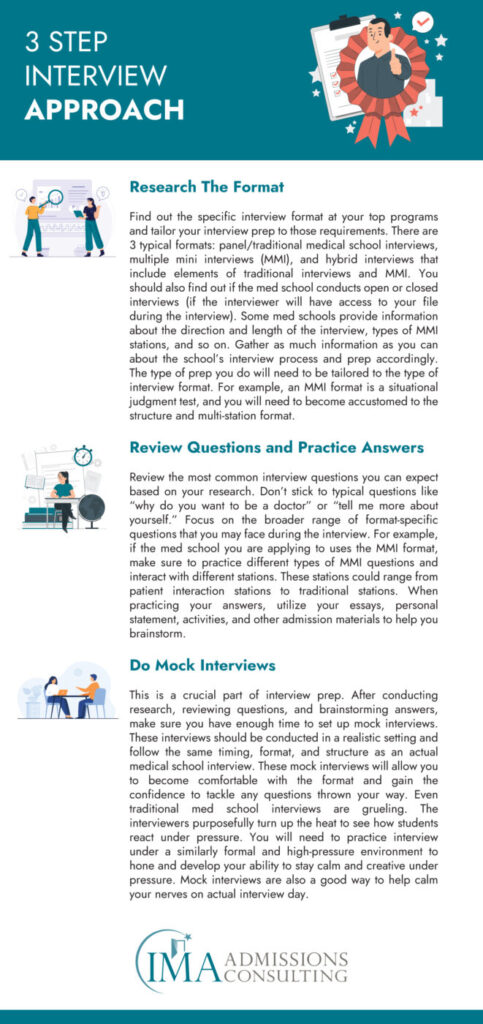Introduction
Embarking on a medical career often starts with an interview. Interviews in medical schools can come in different formats, and a key distinction is whether the interview is “open file” or “closed file.” While these terms may seem like insider jargon, understanding them can give you an invaluable advantage during your application process. This comprehensive aims to show what open and closed file interviews entail, why they matter, and how you can best prepare for each.
What are Open Interviews
Understanding the Open File Interview
An open file interview is one where the interviewer can access your entire application. Everything is on the table, from your GPA and MCAT scores to extracurricular activities and personal statements. This type of interview setting offers a lens into your academic journey, achievements, and interests in the medical field.
What are Open Interviews Advantages and Disadvantages
What are Open Interviews Advantages
The most significant benefit of an open file interview is that it can lead to a rich, detailed dialogue with your interviewer. They’re already aware of your academic background and other qualifications, creating an opportunity for a nuanced conversation. This is the time to clarify or expand upon any points you made in your application or to shed light on your particular areas of interest in medicine.
What are Open Interviews' Disadvantages
However, there’s also a downside. The fact that every part of your application is up for discussion means you could be asked about any detail, no matter how minor it might seem. Therefore, you should be prepared to discuss everything from grades and test scores to research projects and extracurricular activities. If there’s a low grade or a gap in your résumé, expect to discuss it. Therefore, thorough familiarity with your own application is imperative; surprises are the last thing you want in this setting.
Preparing for an Open File Interview
Review Your Application
The first and most important task is to revisit your application in detail. This isn’t just a quick read-through; you need to understand the narrative that your application tells about you. What are the strong points? Where are the potential weaknesses? Be prepared to discuss each of them, and think of how each aspect of your application contributed to your desire and qualification to enter the medical profession.
Consult Experts
Given that open file interviews allow for a deeper level of conversation, it’s often useful to consult with experts to prepare adequately. Medical school admissions consulting services, like those offered by International Medical Aid, can provide insights into what interviewers typically look for and how best to present yourself.
Mock Interviews
Another invaluable tool in your preparation is the mock interview. Simulating the actual experience can help you understand the pacing and the kinds of questions asked and give you a chance to practice your answers. Mock interviews often offer you the chance to receive feedback, which you can then use to improve your performance during the real interview.
Additional Preparation Tips
Understand Your Unique Selling Points
In an open file interview, your interviewer has your stats; they need the story that goes with those numbers. Understand what sets you apart from other candidates. Is it your unique combination of skills? Your broad set of experiences? Know your unique selling points and be prepared to discuss them.
Brush Up on Current Events in Medicine
Open file interviews often stray into topical issues in medicine. Keep yourself updated on recent advances, ethical questions, and other matters of contemporary concern in the medical field. Your informed opinions show you’re engaged and passionate about your future profession.
Prepare Questions for the Interviewer
Finally, remember that interviews are a two-way street. You’re also assessing if the school is the right fit for you. Have a set of insightful questions prepared to ask your interviewer about the curriculum, faculty, research opportunities, or any other aspects of the medical school that interest you.
Open file interviews can be a challenging yet rewarding experience. They offer a chance to reinforce your application with a narrative, presenting you as well-rounded. While the scope of discussion can be wide-ranging, covering everything from academics to personal interests, this very depth can work in your favor. With adequate preparation, a clear understanding of your strengths and weaknesses, and the right guidance from experts, you can turn your open file interview into a strong asset in your medical school application process.
Understanding the Closed File Interview: An Opportunity and a Challenge
What is a Closed File Interview?
The closed file interview is a unique format where the interviewer knows little about you beforehand. Unlike an open file interview, where your academic and extracurricular background is open for discussion, here you start with what is essentially a blank slate. Your name and a few additional minor details are the only information the interviewer might have. This creates an environment where you can freely define yourself—your qualities, achievements, and goals.
Advantages and Disadvantages of Closed File Interviews
Advantages
The primary advantage of a closed file interview is the absence of pre-existing judgments. You walk into the room without labels on your academic performance or test scores. This format allows your personality, skills, and ambitions to take center stage, unobscured by past achievements or setbacks.
Disadvantages
However, the format also has its pitfalls. The interview’s time constraints mean you have a limited window to encapsulate your entire self—your past, accomplishments, and future aspirations. The absence of a prepared file on you means you have to cover this expansive ground rapidly and comprehensively. This situation can be daunting for many and demands an all-encompassing presentation of oneself, which can be tough to achieve in a short time.
Preparing for a Closed File Interview
Given the limitations and opportunities of a closed file interview, adequate preparation is crucial. Here are some aspects to focus on:
Educational Background
Be ready to outline your entire educational journey. Start from your early interests in the sciences or healthcare and go on to detail your academic pursuits that have led you toward a medical career.
Achievements and Skills
Have a well-rehearsed inventory of your accomplishments and talents. Whether it’s a research project you led or a volunteer experience that profoundly impacted you, each is a valuable asset in depicting your multi-faceted personality.
Reason for Choice of School
Know why you’re sitting in that specific interview room. What is it about this medical school that aligns with your career and personal goals? Is it the curriculum, the faculty, the research opportunities, or the community impact? Be ready to articulate this clearly.
Mock Interview Practice
Simulating the interview scenario can be especially helpful in this format. At International Medical Aid, we offer mock interview coaching that aims to put you in realistic interview settings. This practice can help you gauge your responses, timing, and overall performance, allowing for adjustments and refinements before the real thing.
How International Medical Aid Can Assist You
Closed file interviews can be tricky, but with the right guidance and preparation, they are entirely manageable. At International Medical Aid, we offer you the expertise needed to excel in this format. Our services include essay support and rapid response times for any queries, but we go beyond that. We help you present yourself in a manner that resonates, not just on paper but also in challenging interview settings like the closed file interview. Our mock interview coaching is designed to simulate real-world scenarios, equipping you with the strategies and poise you need to succeed.
A closed file interview offers an exceptional chance to present a fresh narrative about who you are and what you aspire to become. While the challenges of this format are real, they’re far from impossible, particularly with the right preparation. The key lies in understanding the interview’s dual nature—it’s an opportunity as much as it is a test. And like any test, you can excel with the right preparation and support from resources like International Medical Aid, turning an intimidating experience into a successful step on your journey to medical school.

The 'Halo Effect' in Interviews
Closed file interviews attempt to mitigate what’s known as the ‘halo effect,’ where an interviewer might be biased toward an applicant based on high grades or test scores. By keeping the interviewer blind to these aspects of your application, the school aims for a more unbiased interaction, focusing on the applicant’s responses and character.
Pre-Med Shadowing Study Abroad Program
Having international exposure can be a great talking point during any type of medical school interview, whether it’s open file or closed. Pre-med shadowing study abroad programs offer invaluable experiences that can enrich your global perspective and medical knowledge. Such experiences can also serve as compelling narratives or examples to bring up during your interview.
Facing the Reality of Medical School Admissions
The acceptance rates in medical schools are dauntingly low, often less than 10%. This challenging landscape means that simply having solid academic achievements and relevant experience might not be enough to secure a spot. International Medical Aid (IMA) understands the intricacies of this competitive environment. We go beyond helping you meet the minimum requirements; we assist you in standing out. Our focus is on making sure that your individuality—your unique experiences, values, and ambitions—shines through, leaving an enduring impression on admissions committees.
More than Just Consultation: Your Success, Our Commitment
At IMA, we take a comprehensive approach to support you in multiple ways:
- Essay Support: From the first draft to the final polish, our experts will guide and critique your essays until they fully convey your qualities.
- Prompt Response Times: Life’s unpredictabilities won’t keep us from being there for you. Be it a holiday or an unforeseen event, we ensure that you are never left hanging.
- Support: Queries, concerns, doubts—we address them all. We understand the strains of the application process and are here to offer both guidance and emotional support.
We tailor our services to meet your specific needs, making the road to medical school less daunting.
Beyond Classroom Learning: Real-world Medical Experience
Achieving proficiency in the medical field involves more than just absorbing textbook knowledge and attending lectures. It’s about experiencing diverse healthcare settings, understanding different cultures, and acquiring hands-on skills.
Pre-Med Shadowing Study Abroad Program
For those looking to diversify their experiences, we offer a Pre-Med Shadowing Study Abroad Program. This program provides rich exposure to global health challenges. It is an excellent addition to your portfolio that can be discussed in any medical school interview, whether open file or closed.
A Glimpse into Our Internship Programs
Pre-Medicine/Medicine Internship Program
Our Pre-Medicine/Medicine Internship Program allows you to shadow experienced doctors and be involved in a range of medical cases, thereby broadening your understanding of various medical specialties.
Pre-PA/Physician Assistant Internship Program
Physician Assistants are invaluable in healthcare. In this program, you’ll shadow veteran PAs and understand their essential role in patient care.
Nutrition Placement/Dietetic Internship Program
Address global nutrition issues with our Nutrition Placement/Dietetic Internship Program. This offers you experience in clinical and community settings, focusing on dietary planning and disease prevention.
Pre-Nursing/Nursing Internship Program
Explore the heart of patient care with our Pre-Nursing/Nursing Internship Program. Gain skills and insight into the nursing profession by shadowing experienced nurses.
Mental Health Internship Program
Mental health is a growing concern globally. Our Mental Health Internship Program offers a well-rounded experience in both clinical and therapeutic settings.
Midwifery Internship Program
Specialize in maternal and newborn care with our Midwifery Internship Program. Learn about prenatal care, childbirth techniques, and postpartum care by shadowing experienced midwives.
Physical Therapy/Pre-PT Internships Abroad
Our Physical Therapy Internship Program allows you to work in various settings and understand patient assessment and treatment planning.
Pre-Dental/Dentistry Internship Program
Oral health is crucial, and our Pre-Dental/Dentistry Internship Program offers an in-depth understanding of dental care, ranging from routine check-ups to intricate surgeries.
Each of our internship programs provides an intensive, hands-on experience designed to prepare you for a fulfilling career in healthcare. These experiences not only augment your skill set but also deepen your understanding of the broader healthcare landscape.
With our expert consultation, dedicated support, and diverse internship opportunities, IMA is here to make your journey to medical school less stressful and more successful. From application essays to real-world experience, we’ve got you covered.
Traditional Medical School Interview vs. MMI Interview
Both open file and closed file interviews can occur in different settings: they can either be part of a traditional medical school interview or an MMI (Multiple Mini Interviews) setup. Traditional interviews usually involve a one-on-one discussion with a faculty member, whereas MMI involves multiple short interviews with different interviewers. Each format has its own unique preparation needs and strategies for success.
Final Thoughts
Open file and closed file interviews serve different purposes and offer unique challenges and opportunities. The key to succeeding in either is preparation. Make sure you’re well-versed in your own application and ready to discuss any aspect of it in an open file interview. For closed file interviews, be prepared to present a comprehensive view of who you are, what you’ve achieved, and where you hope your medical career will take you.
Being prepared for both types of interviews can be aided by resources such as medical school admissions consulting, mock interview coaching, and even experiences from a pre-med shadowing study abroad program. Ultimately, the goal is to present your best self in any interview setting, open or closed file, traditional or MMI.
By understanding the nuances of open and closed file interviews, you are better positioned to navigate the complexities of medical school admissions. Good luck, and may you find the perfect fit for your medical education journey.



